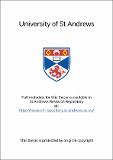Files in this item
Somewhere between eschatology and literature : F.M. Dostoevsky and romantic realism
Item metadata
| dc.contributor.author | Carnighan, Rebecca | en |
| dc.coverage.spatial | 117 p. | en |
| dc.date.accessioned | 2021-04-08T09:20:01Z | |
| dc.date.available | 2021-04-08T09:20:01Z | |
| dc.date.issued | 2002 | |
| dc.identifier.uri | https://hdl.handle.net/10023/22724 | |
| dc.description.abstract | Donald Fanger's work, ‘Dostoevsky and Romantic Realism: A Study of Dostoevsky in Relation to Balzac, Dickens and Gogol’ addresses the seemingly internal paradox of the nineteenth century literary genre 'romantic realism.' He claims that Dostoevsky, with his portrayal of the familiar and the strange in St. Petersburg, is the great inheritor of the romantic realism of Balzac, Dickens and Gogol. Fanger's category of romantic realism evolves from the realism of the nineteenth century, which began with the disillusionment with romanticism, and the desire to portray everyday life as truthfully as possible. Fanger names Balzac, Dickens, Gogol and Dostoevsky as the nineteenth century writers who accomplish what is impossible for other realists. According to Fanger, they present the world, with all its imperfections, both truthfully and beautifully. The question I will address, in regards to Fanger's work, is whether all four succeed, or whether only Dostoevsky does, because his personal vision allows him to see that the world, for all its ugliness, is marked for redemption. I will argue that, in fact, only Dostoevsky does not finally compromise his vision in an effort to construct a believable world. I suggest that Dostoevsky might be able to look at the world both romantically and realistically because of his Christian faith. In the first part of my paper, I will attempt to show that Balzac, Gogol and Dickens strayed from the genre when their personal visions were shattered by reality, using examples from their fiction and excerpts from literary critiques. In the second part of my paper, I will demonstrate how Dostoevsky saw the objective reality in terms of his Christian perspective for the final redemption of the world, rather than projecting his personal vision into an objective reality. I will illustrate this through Dostoevsky's own work, using 'The Idiot' in Chapter Three, 'Crime and Punishment' in Chapter Four, and 'The Brothers Karamazov' in Chapter Five. Finally, I will compare the peculiar Christian logic, which claims the very best outcome for a broken world because of Christ's death on the cross, with Dostoevsky's Christian vision, which allowed his novels to hold together hope and reality. As a true romantic realist, Dostoevsky represents the world both truthfully and beautifully. As a Christian, Dostoevsky possesses the unique ability to demonstrate both the radical evil and uncompromising hope of the world. | en |
| dc.language.iso | en | en |
| dc.publisher | University of St Andrews | en |
| dc.subject.lcc | PG3328.Z6C2 | |
| dc.subject.lcsh | Dostoevskii, F. M.(Fedor Mikhailovich), 1821-1881 | en |
| dc.title | Somewhere between eschatology and literature : F.M. Dostoevsky and romantic realism | en |
| dc.type | Thesis | en |
| dc.type.qualificationlevel | Doctoral | en |
| dc.type.qualificationname | MPhil Master of Philosophy | en |
| dc.publisher.institution | The University of St Andrews | en |
| dc.contributor.institution | Russian Theses | en |
This item appears in the following Collection(s)
Items in the St Andrews Research Repository are protected by copyright, with all rights reserved, unless otherwise indicated.

